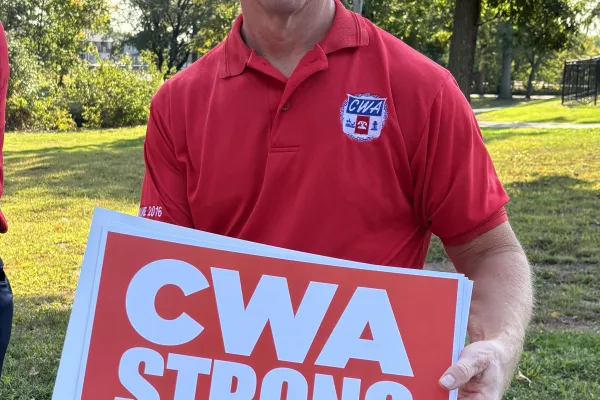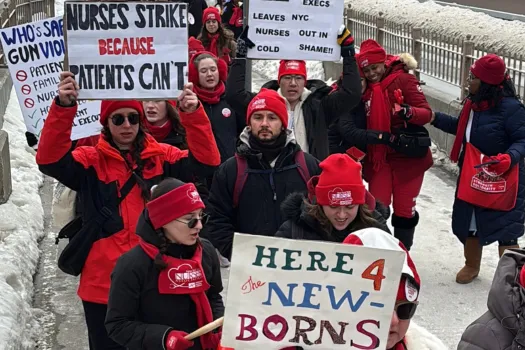High Speed Broadband and Net Neutrality
The build-out of affordable high speed Internet to every American household, business, and community, along with programs to ensure that every American has the skills needed to participate fully in our digital society, remain critical tasks for our nation.
High-speed broadband is the fundamental infrastructure of the 21st century, fueling sustainable economic growth and job creation.
Yet the United States continues to lag behind the rest of the world in high-speed networks. Our nation has fallen to 15th in the world in broadband adoption. More than 100 million Americans do not have broadband at home. There is a persistent digital divide based on race, income, geography, and age. Further, most U.S. broadband networks cannot deliver the speeds necessary to run advanced applications and services that foster sustainable communities and enable cost-effective improvements in education, energy, health, entrepreneurship, and public services.
The Federal Communications Commission’s (FCC) National Broadband Plan provides a blueprint to address these infrastructure challenges. Congress, the FCC, and other state and federal agencies must move forward expeditiously to implement the National Broadband Plan to spur building and upgrading our high-speed networks, expanding good union jobs in the industry, providing affordable access and digital skills to every American, and building one gigabyte high speed capacity to every school, library, and health facility.
Building one gigabyte high speed capacity to our community anchor institutions establishes a high speed framework for every community. These connections can become the gateway for truly high-speed connections to homes and businesses. Advanced high-speed networks reduce the barriers of distance, allowing people to access the unlimited information on the Internet and providing them with the latest developments in education, health care, and public services in their own communities.
Unfortunately, a recent court decision threatens to divert attention from these critical national objectives. A D.C. Circuit Court of Appeals decision (Comcast v FCC) has put into question the FCC’s authority over broadband Internet services. In light of this court decision, some now ask whether the FCC can act to transition universal service funds to support broadband and to protect an open Internet.
In an attempt to resolve that question, FCC Chairman Julius Genachowski has proposed reclassifying broadband Internet access as a heavily regulated Title II common carrier communications service.
CWA believes the “reclassification path” will lead to years of litigation and regulatory uncertainty that will reduce broadband investment and jobs. At a time of 10 percent unemployment – including layoffs in the telecom sector – workers in the industry cannot afford to see capital shifted from investment in advanced networks. Nor can our communities afford to wait to realize the benefits of high-speed connections.
CWA Supports Narrow, Targeted Legislation to Clarify FCC Authority to Promote Universal, Affordable Broadband and an Open Internet
CWA believes Congress should step in now to clarify FCC authority to direct Universal Service funding to broadband and to protect an open Internet. Such narrowly targeted legislation would:
- Make clear that federal Universal Service funding may be used to support broadband build out and programs to encourage broadband adoption and use by low-income households;
- Establish the FCC Open Internet principles as the law of the land, ensuring that broadband Internet service providers (ISPs) do not prevent users from sending and receiving the lawful Internet content of their choice; running lawful applications and services of their choice, subject to the needs of law enforcement; and connecting their choice of legal devices that do not harm the network, all subject to reasonable network management;
- Require broadband Internet access, service, application, and content providers to make available to consumers transparent and accurate information, in widely spoken languages, including Spanish, about the capabilities and network management practices of their offerings;
- Ensure that broadband ISPs do not engage in unreasonable discrimination against any lawful Internet content, application, or service that harms competition or consumers (this means that broadband ISPs cannot make exclusive deals);
- Ensure that minority business and entrepreneurs are given meaningful opportunities to participate in the build out of high-speed networks.
CWA believes that narrow, tailored legislation based on these principles is the best and fastest way to move forward. Leading civil rights and labor organizations including the NAACP, the National Urban League, the League of United Latin American Citizens, the AFL-CIO and the Sierra Club have joined CWA in support of such congressional action.
A “Net Neutrality” Middle Ground
The principles CWA proposes to protect an open Internet represent a “middle ground” in the net neutrality debate. They carefully balance the goals of protecting an open Internet with the critical goal of investment to upgrade our broadband networks and create jobs.
The FCC estimates that it will cost $350 billion to build truly high-speed networks capable of 100 megabit per second to every corner of our nation. Private capital will largely fund those investments. In order to pay for these enormous investments, network operators must be able to sell specialized services such as video and to manage their networks efficiently.
Moreover, such network investments must support the creation of good, union jobs. The jobs at the largest network companies, such as AT&T, Verizon, and Qwest, far exceed those at the Internet application companies (many of which are located overseas). While Facebook and Craigslist have transformed online communications, they employ only 800 and 30 workers, respectively compared to AT&T with 280,000 employees.
Jobs at Broadband Network Companies
Far Exceed Jobs at Applications Companies
Network Providers Employees Applications Providers Employees
AT&T 281,000 Amazon 24,300
Verizon 229,900 Google 19,800
Comcast 107,000 Yahoo 13,900
Sprint 40,000 Ebay Inc. 16,400
Time Warner Cable 47,000 Expedia 7,960
Qwest 27,800 IAC 3,200
CenturyLink 20,200 Cbeyond 1,680
Cablevision 16,800 Facebook 800
Windstream 7,400 TiVo Inc 510
Frontier 5,400 Linkedin 320
MediaCom 4,500 Zynga 250
Cinn Bell 3,200 Craigslist 30
Total 790,200 Digg 18
Flickr Owned by Yahoo
Meetup 24
Mozilla 58
OpenDNS NA
Skype Owned by Ebay
Twitter 140
Vuze 30
Youtube owned by Google
Total 89,420
Network providers include 12 largest telecom, cable, wireless employers, excluding privately-held Cox Cable for which data is not available. Employees are almost all in the United States.
Applications providers include signatories of letter to FCC Chairm
Network companies' employees are primarily in the United States, unlike the application companies.
Source: yahoo.com; Craigslist.com; Lexis/Nexis; SEC Forms 10-K for year ending 2009
In summary, CWA urges members of Congress to support narrow, targeted legislation to clarify FCC authority to promote high-speed broadband build-out and protect an open Internet. By taking this step, we will make sure that all Americans, and most especially our children, have access to the unlimited information on the Internet, and that our nation will lead the world in advanced communications networks capable of supporting sustainable communities and spurring economic growth and job creation today and into the future.
Local 1180 Member Searches for Kidney Donor to Save Her Son
From the Desk of the Assistant to the Vice President of CWA District 1
10,000 New York State Nurses Association Members Win Strike in NYC; 5,000 More Press On, Entering Week Five


